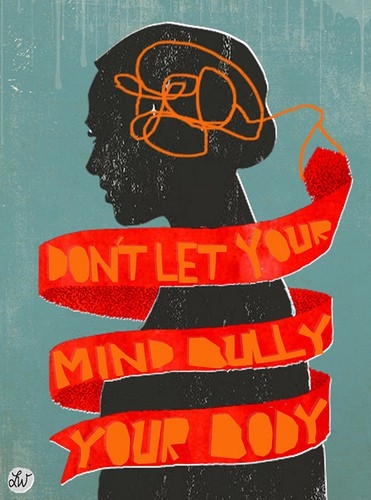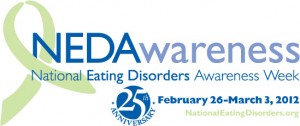February 27 – March 3 is Body Image Warrior Week. Throughout the course of this week, you’ll read posts from an inspiring group of women who fight hard against body image oppression through their own words and work.
I am honored to introduce you to Elissa Stern of Dress with Courage. I was just introduced to Elissa through this Body Image Warrior Week effort, and this piece on eating disorders and the trouble with saying no made me an instant fan. I know you’ll dig her, too. Here’s some food for thought from Elissa:
When I look into the mirror, my eyes immediately zoom in on my stomach. I am by far the most sensitive about that part of my body than any other, so much so that I’ve dedicated entire blog posts just to my contentious relationship with that body part. The state of my stomach defines my mood, my diet, and the level of anxiety I feel during the day. When it is flat I feel confident; when it’s bloated or bulging I feel anxious and depressed. I don’t want to be touched; I wear long shirts and Spanx in an effort to conceal what I am certain looks like a 9 month pregnancy belly; and, worst of all, I miss the days of my anorexia and bulimia, when my hipbones jutted forward proudly and my stomach was concave.I was having dinner with two friends the other day when the conversation wound to our bodies – specifically, what parts each of us despised the most. One friend lamented her calves and thighs, which she proclaimed “huge.” Her discomfort towards them was so strong that it dictated how she dressed – no short skirts, shorts or body skimming pants for her. The other complained about the “junk in her trunk” – her booty, which she felt had gotten bigger and bigger in the past few years. For the life of me, I could not see what either had to complain about. I didn’t see huge legs, or a big butt, or any flaws at all. They each looked beautiful – two well-dressed, intelligent women I was proud to have dinner with.Most of the time, the image someone has of their body is pretty close to its external appearance. You may see your thighs as slightly bigger than they actually are, or your arm muscles as slightly smaller, but the discrepancy is usually minimal. In some mental disorders, however, body image can become dramatically distorted. Those who suffer from body dysmorphic disorder think that parts of their bodies are malformed or grotesque, even when these supposed flaws are not noticeable to others. In eating disorders such as anorexia patients continue to think they need to lose weight even as their bodies become emaciated.When I was in treatment for anorexia, one common group therapy activity was body tracing. We’d sketch an outline of our bodies on a life-size piece of butcher paper, then lie in the outline as another patient traced our actual size inside of it. The discrepancy between what we thought our body shape was, and what it actually was, astounded us. I couldn’t help but flash back to this memory after dinner concluded. I wondered how far off the average woman’s perception of her body is from her actual size.What people see in their mirror and how they believe they look varies wildly according to age, ethnic group, sexual orientation, mood, what they’ve been watching on TV, what magazines they read, whether they’re married or single, what kind of childhood they had, whether they take part in sports, what phase of the menstrual cycle they’re in, whether they are pregnant, where they’ve been shopping – and even what they had for lunch. All research to date on body image shows that women are much more critical of their appearance than men, and much less likely to admire what they see in the mirror. Up to 8 out of 10 women will be dissatisfied with their reflection, and more than half may see a distorted image. According to the authors of the website My Body Gallery, 95 percent of non-eating disordered women overestimate the size of their hips by 16 percent and their waists by 25 percent, yet the same women were able to correctly estimate the width of a box. In a world full of images of how we ‘should’ look it can get difficult to tell how we DO look.Your body image is how you perceive, think and feel about your body. This may have no bearing at all on your actual appearance. I’ve been feeling really crappy about my appearance lately, but while I’m struggling, I’m trying to figure out what has triggered these negative thoughts. My two friends mentioned the anxieties they’re currently struggling with – work stress, and shame for having not attending college. I believe there’s a direct correlation between how we see our bodies and external stress.
Eager to learn more about who is participating in Body Image Warrior Week? Check out this list of participants.





